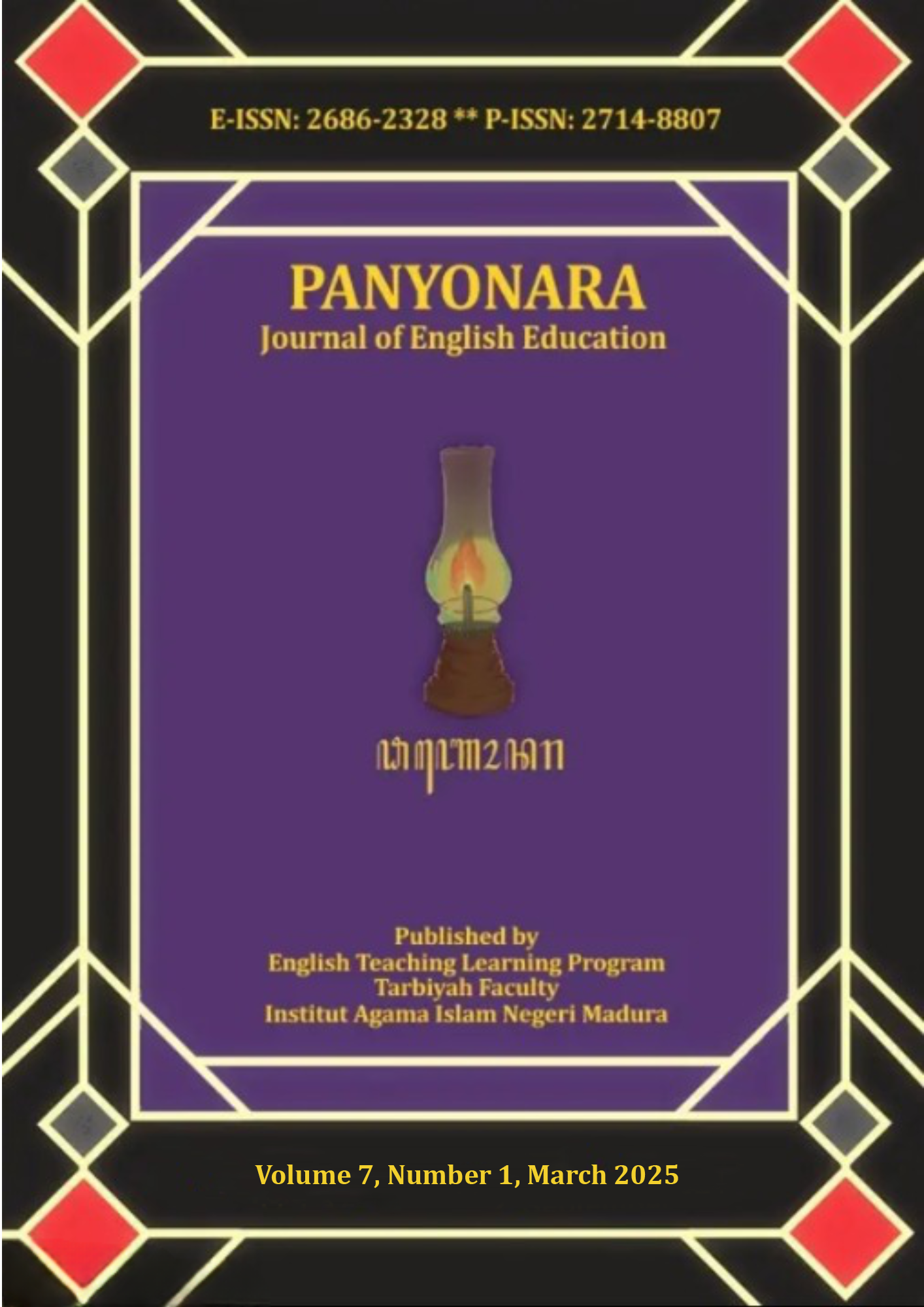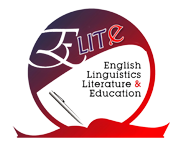Breaking Barriers: Integrating Padlet to Introduce Environmental Education to Pre-Service Teachers
 Abstract views: 39
,
Abstract views: 39
,
 PDF downloads: 29
PDF downloads: 29
Abstract
This study explores the integration of Padlet, a web-based digital platform, into environmental education for pre-service teachers at Tadris Bahasa Inggris (TBI) of IAIN Madura, Indonesia, using a mixed-methods approach. A purposive sample of 98 pre-service teachers from 47 Teaching Practice 1 pre-service teachers and 51 TEYL pre-service teachers from TBI participated. The research aims to bridge the gap between environmental education theory and teaching practice by utilizing Padlet as a learning medium. Data collection included pre- and post-surveys on pre-service teachers' perceptions and knowledge of environmental education and technology, along with interviews, observations, and course material analysis. Quantitative data were analyzed using descriptive statistics, while qualitative data underwent thematic analysis. Findings indicate that Padlet significantly enhances student engagement, collaborative learning, and understanding of environmental concepts. The platform's versatility allows for interactive activities that cater to diverse learning styles, fostering critical thinking and environmental consciousness. Despite challenges such as resource constraints and varying levels of digital literacy, the study highlights the potential of digital tools like Padlet to enrich environmental education. The research contributes to the scholarship on innovative pedagogical approaches in sustainability education and offers recommendations for integrating technology into teacher training programs. Findings provide insights into how Padlet supports critical thinking, collaboration, and environmental awareness in teacher education, demonstrating its value as a transformative tool for preparing environmentally conscious future educators.
Downloads
References
Abubakari, M. S., Zakaria, G. A. N., Priyanto, P., & Triantini, D. (2023). Analysing Technology Acceptance for Digital Learning in Islamic Education: The Role of Religious Perspective on ICT. Journal of Computing Research and Innovation, 8(1), 1–16. https://doi.org/10.24191/jcrinn.v8i1.344
Abraham, M., Arficho, Z., Habtemariam, T., & Demissie, A. (2022). Effects of Information Communication Technology-Assisted Teaching Training on English Language Teachers’ Pedagogical Knowledge and English Language Proficiency. Cogent Education, 9(1), 2028336. https://doi.org/10.1080/2331186X.2022.2028336
Aliman, M., & Mutia, T. (2021). The Effect of Digital Eco-Learning in Student Worksheet Flipbook to Environmental Project Literacy and Pedagogic Competency. JOTSE: Journal of Technology and Science Education, 11(2), 357–370. https://doi.org/10.3926/jotse.1175
Arfiani, Y., Hayati, M. N., & Anwar, I. K. (2021). The Implementation of the PJBL Method Assisted by Padlet on Environmental Pollution Material on Student Science Literature. Journal of Science Education Research, 5(2), 21–27. https://doi.org/10.21831/jser.v5i2.44289
Atif, S. (2024). Sustainable Scholars: Nurturing Environmental Awareness in Grade VII Through Empowering Social Studies Textbooks. Frontline Social Sciences and History Journal, 4(2), 16–23. https://doi.org/10.37547/social-fsshj-04-01-03
Baidoo, M., Ameyaw, Y., & Annan, J. (2022a). Assessing the Effectiveness of Padlet Instructional Tool in the Teaching and Learning of some Ecological Concepts. International Journal of Sciences, 11(04), 27–33. https://doi.org/10.18483/ijSci.2554
Baidoo, M., Ameyaw, Y., & Annan, J. (2022b). Efficacy of Padlet Instructional Tool on Studentsâ€Tm Engagement and Perception in the Teaching and Learning of Some Ecological Concept. International Journal of Sciences, 11(04), 27–33. https://doi.org/10.18483/ijSci.2555
Barr, S., & Prillwitz, J. (2014). A Smarter Choice? Exploring the Behaviour Change Agenda for Environmentally Sustainable Mobility. Environment and Planning C: Government and Policy, 32(1), 1–19. https://doi.org/10.1068/c1201
Beauchamp, C., & Thomas, L. (2009). Understanding Teacher Identity: An Overview of Issues in the Literature and Implications for Teacher Education. Cambridge Journal of Education, 39(2), 175–189. https://doi.org/10.1080/03057640902902252
Bower, M., DeWitt, D., & Lai, J. W. (2020). Reasons Associated with Pre-service Teachers' Intention to Use Immersive Virtual Reality in Education. British Journal of Educational Technology, 51(6), 2215–2233.
Boz, Y., & Cetin-Dindar, A. (2021). Teaching Concerns, Self-Efficacy Beliefs and Constructivist Learning Environment of Pre-service Science Teachers: A Modelling Study. European Journal of Teacher Education, 46(2), 1–19. https://doi.org/10.1080/02619768.2021.1919079
Buchanan, J. (2019). Promoting Environmental Education for Primary School-Aged Students Using Digital Technologies. Eurasia Journal of Mathematics, Science and Technology Education, 15(2). https://doi.org/10.29333/ejmste/100639
Chawla, L. (2020). Childhood Nature Connection and Constructive Hope: A Review of Research on Connecting with Nature and Coping with Environmental Loss. People and Nature, 2(3), 619–642. https://doi.org/10.1002/pan3.10128
Creswell, J. W., & Poth, C. N. (2016). Qualitative Inquiry and Research Design: Choosing Among Five Approaches. London: Sage Publications.
Deni, A. R. M., & Zainal, Z. I. (2018). Padlet as an Educational Tool: Pedagogical Considerations and Lessons Learnt. Proceedings of the 10th International Conference on Education Technology and Computers, 156–162. https://doi.org/10.1145/3290511.3290512
Dianati, S., Nguyen, M., Dao, P., Iwashita, N., & Vasquez, C. (2020). Student Perceptions of Technological Tools for Flipped Instruction: The Case of Padlet, Kahoot! And Cirrus. Journal of University Teaching & Learning Practice, 17(5). https://doi.org/10.53761/1.17.5.4
Ekantini, A., Wijayanti, I. D., & Andania, R. A. (2024). Transformative Sustainable Education Approach as Environmental Literacy Transformation: Case Study of Ecosystem Material in Elementary Schools. Łdots Pendidikan Sains Indonesia. https://jurnal.usk.ac.id/JPSI/article/download/40677/21870
Eliyawati, E., Widodo, A., Kaniawati, I., & Fujii, H. (2023). The Effectiveness of Teacher Training on Environmental Education: Challenges and Strategy for Future Training Program. Jurnal Penelitian Pendidikan IPA, 9(8), 6056–6066.
Evans, N., Tomas, L., & Woods, C. (2016). Impact of Sustainability Pedagogies on Pre-service Teachers’ Self-Efficacy. Journal of Education for Sustainable Development, 10(2), 243–261.
Hadi, M. P., Saiful, H., & Abadi, M. F. (2021). KAMPUS ZERO PLASTIK (Menubuhkan Visi dan Nilai Profetik ke Dalam Perilaku Masyarakat Kampus).
Huda, M., Jasmi, K. A., Mustari, I., Basiron, B., & Sabani, N. (2017). Traditional Wisdom on Sustainable Learning: An Insightful View From Al-Zarnuji’s Ta ‘Lim Al-Muta ‘Allim. SAGE Open, 7(1), 2158244017697160.
Humairoh, M. F. N., Widiati, U., Rabbianty, E. N., & Basthomi, Y. (2024). Pre-service English Teachers’ Beliefs About Implementing Digital Multimodal Composing in a Teaching Practicum Context. Journal of Applied Research in Higher Education, ahead-of-print(ahead-of-print). https://doi.org/10.1108/JARHE-04-2024-0201
Kalsoom, Q., & Khanam, A. (2017). Inquiry Into Sustainability Issues by Pre-service Teachers: A Pedagogy to Enhance Sustainability Consciousness. Journal of Cleaner Production, 164, 1301–1311.
Karanjakwut, C., & Sripicharn, P. (2024). Exploring the Experiences, Challenges, and Perspectives in Digital Literacy Training of Older Thai EFL Teachers With Low Digital Literacy. Anatolian Journal of Education, 9(1), 81–96.
Martínez Valdivia, E., Pegalajar Palomino, M. del C., & Burgos-Garcia, A. (2023). Active Methodologies and Curricular Sustainability in Teacher Training. International Journal of Sustainability in Higher Education, 24(6), 1364–1380.
Mehta, K. J., Miletich, I., & Detyna, M. (2021). Content-Specific Differences in Padlet Perception for Collaborative Learning Amongst Undergraduate Students. Research in Learning Technology, 29. https://doi.org/10.25304/rlt.v29.2551
Micalay-Hurtado, M. A., & Poole, R. (2022). Eco-Critical Language Awareness for English Language Teaching (Elt): Promoting Justice, Wellbeing, and Sustainability in the Classroom. Journal of World Languages, 8(2), 371–390. https://doi.org/10.1515/jwl-2022-0023
Parry, S., & Metzger, E. (2023). Barriers to Learning for Sustainability: A Teacher Perspective. Sustainable Earth Reviews, 6(1), 2. https://doi.org/10.1186/s42055-022-00050-3
Purmayanti, D. (2022). The Challenges of Implementing Digital Literacy in Teaching and Learning Activities for EFL Learners in Indonesia. BATARA DIDI: English Language Journal, 1(2), 101–110.
Rabbianty, E. N., Raihany, A., Syafik, M., Muqoddas, N., Irwansyah, H., Rahmawati, F., & Febrianingrum, L. (2022). Pemahaman Mahasiswa Terhadap Literasi Lingkungan (Ekoliterasi): Potensi dan Tantangan Menuju Kampus Ramah Lingkungan. Andragogi: Jurnal Diklat Teknis Pendidikan dan Keagamaan, 10(2), 163–176. https://doi.org/10.36052/andragogi.v10i2.302
Rabbianty, E. N., Utami, D. N., Humairoh, M. F. N., & Suryati, N. (2024). Exploring English Lecturers’ Self-Efficacy in the Use of Educational Technology in Post COVID-19 Pandemic. Studies in English Language and Education, 11(1), 362–383. https://doi.org/10.24815/siele.v11i1.30978
Ramachandiran, C. R., & Mahmud, M. M. (2018). Padlet: A Technology Tool for the 21st Century Students Skills Assessment. ICEAP 2019, 1(1), 101–107. https://doi.org/10.26499/iceap.v1i1.81
Readette, M., & Harvey, J. (2022). Padlet, Polls, Phone Apps and Flipgrid: A Rich Menu of Digital Literacy to Build a Community of Engaged Online Learners. InternationalEd2022: Internationalisation of Higher Education at Home: Implications for an Evolving World, 47–48.
Saiful, J. A. (2023). Eco-ELT for Environmental Research and Praxis in ELT. Journal on English as a Foreign Language, 13(2), 373–398. https://doi.org/10.23971/jefl.v13i2.6335
Shadiev, R., Reynolds, B. L., & Li, R. (2024). The Use of Digital Technology for Sustainable Teaching and Learning. Sustainability, 16(13), 5353. https://doi.org/10.3390/su16135353
Shuker, M.-A., & Burton, R. (2021). Educational Technology Review: Bringing people and ideas together with ‘Padlet.’ Journal of Applied Learning & Teaching, 4(2). https://doi.org/10.37074/jalt.2021.4.2.9
Tondeur, J., Aesaert, K., Prestridge, S., & Consuegra, E. (2018). A Multilevel Analysis of What Matters in the Training of Pre-service Teacher’s Ict Competencies. Computers & Education, 122, 32–42. https://doi.org/10.1016/j.compedu.2018.03.002
Trott, C. D. (2020). Children’s Constructive Climate Change Engagement: Empowering Awareness, Agency, and Action. Environmental Education Research, 26(4), 532–554. https://doi.org/10.1080/13504622.2019.1675594
UNESCO 2017. (2018). The United Nations Educational, Scientific and Cultural Organization. https://unesdoc.unesco.org/ark:/48223/pf0000261971
Villar-Onrubia, D., Morini, L., Marín, V. I., & Nascimbeni, F. (2022). Critical Digital Literacy as a Key for (Post) Digital Citizenship: An International Review of Teacher Competence Frameworks. Journal of E-Learning and Knowledge Society, 18(3), 128–139. https://doi.org/10.20368/1971-8829/1135697
Zhao, L., Rahman, M. H., Yeoh, W., Wang, S., & Ooi, K.-B. (2024). Examining Factors Influencing University Students’ Adoption of Generative Artificial Intelligence: A Cross-Country Study. Studies in Higher Education, 1–23. https://doi.org/10.1080/03075079.2024.2427786
The journal uses an Open Access policy under a Creative Commons Attribution-NonCommercial 4.0 International License. Authors who publish with this journal agree to the following terms:
- Authors retain copyright and grant the journal right of first publication with the work simultaneously licensed under a Creative Commons Attribution License that allows others to share the work with an acknowledgment of the work's authorship and initial publication in this journal.
- Authors are able to enter into separate, additional contractual arrangements for the non-exclusive distribution of the journal's published version of the work (e.g., post it to an institutional repository or publish it in a book), with an acknowledgment of its initial publication in this journal.
- Authors are permitted and encouraged to post their work online (e.g., in institutional repositories or on their website) prior to and during the submission process, as it can lead to productive exchanges, as well as earlier and greater citation of published work.
















